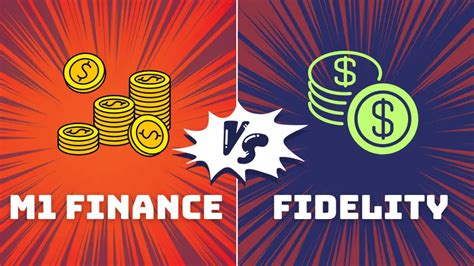Tentu, berikut adalah artikel tentang perbandingan M1 Finance vs Fidelity:
M1 Finance vs. Fidelity: Which Broker Is Right for You?
Choosing the right brokerage firm can feel overwhelming. With so many options available, it's crucial to weigh the pros and cons of each platform to find the best fit for your individual needs and investment goals. This detailed comparison of M1 Finance and Fidelity will help you decide which broker is right for you.
Overview: M1 Finance vs. Fidelity
Both M1 Finance and Fidelity are reputable brokerage firms offering a range of investment options, but they cater to different investor profiles. Fidelity, a long-established giant in the financial industry, boasts a comprehensive suite of services, from traditional brokerage accounts to retirement planning and sophisticated investment tools. M1 Finance, a relative newcomer, focuses on a streamlined, user-friendly platform emphasizing automated investing and pie portfolios.
Key Differences:
-
Investment Philosophy: Fidelity provides a broad range of investment choices, catering to both beginners and experienced investors. M1 Finance simplifies investing with its pie chart portfolio functionality, ideal for automated, hands-off investing.
-
Fees: Both platforms offer fee-free trading for many stocks and ETFs, but Fidelity’s fee structure can be more complex depending on the services used. M1 Finance's pricing is generally straightforward.
-
Platform Features: Fidelity provides a wider array of tools and resources, including research, educational materials, and advanced trading platforms. M1 Finance excels in its intuitive interface and automated investing features.
-
Target Audience: Fidelity appeals to a broad spectrum of investors, from beginners to professionals. M1 Finance is particularly well-suited for beginner and intermediate investors who prefer a simplified, automated approach to investing.
M1 Finance: A Deep Dive
M1 Finance stands out with its unique "pies" functionality. These visual representations allow you to allocate your portfolio across various asset classes and individual stocks or ETFs, customizing your investment strategy. Their automated investing feature, "M1 Spend," seamlessly integrates with your brokerage account, allowing for regular contributions and automated rebalancing.
M1 Finance Pros:
- Intuitive Interface: Extremely user-friendly, making it ideal for beginners.
- Automated Investing: Set it and forget it – perfect for hands-off investing.
- Pie Portfolios: Visual and customizable portfolios simplify asset allocation.
- M1 Borrow: Offers margin loans at competitive rates.
- Relatively Low Fees: Primarily commission-free trading.
M1 Finance Cons:
- Limited Research Tools: Compared to Fidelity, the research tools are less comprehensive.
- Fewer Investment Options: Offers a narrower range of investment choices than Fidelity.
- Customer Support: Some users report inconsistent customer service experiences.
Fidelity: A Comprehensive Look
Fidelity, a well-established firm, offers a vast array of financial products and services. Beyond brokerage accounts, they provide retirement planning tools, educational resources, and advanced trading platforms suitable for experienced investors. Their extensive research capabilities and customer support are key selling points.
Fidelity Pros:
- Extensive Investment Options: Access to a wide range of investments.
- Robust Research Tools: In-depth research and analysis capabilities.
- Excellent Customer Support: Generally highly rated customer service.
- Diverse Account Types: Offers a wide array of accounts to suit various needs.
- Advanced Trading Platforms: Provides sophisticated trading tools for experienced investors.
Fidelity Cons:
- Steeper Learning Curve: The platform can be overwhelming for beginners.
- Potentially Higher Fees: Depending on the services used, fees can be more complex and potentially higher than M1 Finance.
- More Complex Interface: Less intuitive than M1 Finance's platform.
The Verdict: Which Broker Is Best?
The "best" broker depends entirely on your investment style and experience level.
-
Choose M1 Finance if: You're a beginner or intermediate investor seeking a simplified, automated approach to investing with a user-friendly interface. You value ease of use and visual portfolio management.
-
Choose Fidelity if: You're an experienced investor requiring a wide range of investment options, advanced trading tools, and extensive research resources. You're comfortable navigating a more complex platform and prefer a large, established firm.
Ultimately, understanding your investment goals and comfort level with technology is crucial in selecting the right brokerage. Carefully consider the features, fees, and services offered by both M1 Finance and Fidelity to make an informed decision. Remember to conduct thorough research beyond this comparison before making any investment decisions.
